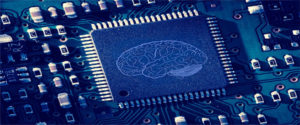
THE UPLOADED MINDS OF THE POST-HUMAN BEING
According to futuristic theories, the post-human will no longer be a human being in the biological sense. There is even talk of an immortality that will live forever in a software. The idea is not new. It was already considered by the Austrian expert in artificial intelligence Hans Moravec in his book Mind Children: The Future of Robot and Human Intelligence, written in 1988. While doing research on robotics for NASA and the US Army, he imagined the possibility of reading all the information inserted in the neurons of a human being, copying it and uploading it to a computer.
Moravec's proposal is shocking because there is still no procedure for turning the whole mind, including consciousness, into any format. Other pioneers of technological philosophy have reformulated the concept in the sense of improving the mind, freeing it from the limitations of a brain that degenerates and dies.
The idea of saving the memories and identity and uploading it to the Net is one of the most groundbreaking of transhumanism. And there are many biological minds that are looking for ways to become digital, which is just another example of the classic human desire to perpetuate itself in time, to achieve immortality. Today, there are those who seek to convert their minds into digital systems, to separate them from the corrupt hardware that is their flesh and blood body. This would allow making backups that would serve to restart the "system" in case the physical body had serious problems, such as illnesses or operations. In this way, if something went wrong or failed, the most important part of the being would always be saved, and it could be dumped into a new system.
During the memory wipe scan, it was discovered that memories are somehow stored in groups of neurons, and if these are activated, they can be recalled. This suggests that there is a real possibility of scanning the memories, as well as other psychological information physically stored in the neurons, and making a digital copy of all of them.
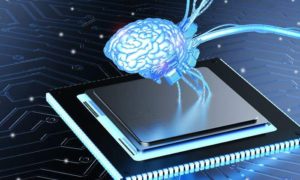 On the other hand, some research goes in the line of copying a mind by means of interfaces and neural prostheses. In this sense, one option would be to copy the neuronal activity with the well-known biomimetic chips, which copy and reproduce responses to chemical and mechanical stimuli of the organs in order to be analyzed in the laboratory.
On the other hand, some research goes in the line of copying a mind by means of interfaces and neural prostheses. In this sense, one option would be to copy the neuronal activity with the well-known biomimetic chips, which copy and reproduce responses to chemical and mechanical stimuli of the organs in order to be analyzed in the laboratory.
Given that the complete functioning of the brain is unknown, it is unfeasible to make a correct reading of the reactions to the biochip stimuli, and it will most likely be necessary to wait for artificial intelligence (AI) to completely decipher the secrets of the brain before even considering its reproduction.
At the moment, knowledge about neuronal activity hardly allows to decipher emotions and sensations, or, experimentally, to decipher some word. This lack of knowledge implies that, as much as neuronal activity can be copied, the most important part is missing: how from the brain's biochemical activity arises thought and consciousness.
The simple human is a thing of the past
The reality is that we humans have been turning our minds to writing for millennia, which has survived centuries in time and space. In the new context, the difference would be to put the writer's conscious mind into the book and let him tell his story. Can we imagine opening a book by Aristotle and having the Greek philosopher's own mind tell us about it and then interacting with him? Without a doubt, an interactive experience as stimulating as it is disturbing.
The questions that arise are of all kinds, including legal. How many copies could be made of a mind? In the example of Aristotle, how many of his books would his mind be in? How many people could he interact with? And very importantly, who would have access to this privileged knowledge? Only an elite (which would allow him to exercise a more dominant position over the rest of the population)?
On the other hand, once the mind was digitized, there would be nothing to prevent its massive reproduction, which would generate not a few identity problems. If the mind has a learning system, it is to be assumed that a digital mind will also continue to learn, but if it does so from different and consecutive copies, would this learning change the identity? Would the solution be to save the original mind in a server that would receive updates from the copies of the mind scattered throughout space?
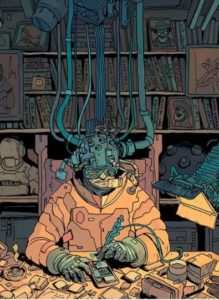
The proposal of the digitalized mind allows it to remain alive beyond its relationship with the body, it is the immortality of the conscious mind. As this idea enters the metaphysical terrain of religion and the soul, many theologians reflect on the possibilities, advantages and dangers of radical transhumanism. This transhumanist aspiration is framed in cyberpunk science fiction, the most radical transgression to mind-body dualism since the emergence of the idea of a quantum relationship between the two.
There is still no consensus on what the method of transmission of information and experiences to the digitized mind is. For some, the digitized mind will need an external sensor that allows it to receive information from the outside, as if they were brain prostheses that capture information from the outside and translate it into bits. In fact, this type of prosthesis already exists. For example, those that allow people to see thanks to a prosthesis that receives visual information from the outside; others make it possible to have touch in the artificial limbs. However, this solution again limits the mind to an external object susceptible to deterioration[1] .
It is still necessary to imagine how these minds will communicate with the outside world, as well as how digital minds will relate to other digital elements.
Depending on how you approach the concept of uploading a mind to the Net, different conclusions are drawn, but, given the time that many people spend hooked on the Internet, we could say that, in an experimental way, it is already happening. In our daily lives, more and more technological gadgets are designed to eliminate the barrier between the biological mind and the digital product. This new proposal simply goes one step further, taking the mind out of the body and turning it into binary code.
Those who advocate this tendency have an extremely negative view of the earthly body, and intend to turn it into a simple temporary carcass that serves to gestate the mind until it can be transferred to its eternal support. And if it were not for the fact that they have not yet elucidated how they will manage their relationship to the earthly world, they would surely have already moved from the philosophical equation into practice.
We cannot forget that to separate the mind from the body is to isolate it also from the brain, from its entire biochemical and bioelectric system, which is the basis of our emotions and feelings. In other words, the new mind would lack any sense of pleasure or perception of danger.
How can you replace such a vital organic element for the mind? How will your emotions, moods or cognitive processes materialize? The main question that arises from this digitalization of the mind is whether the result obtained will have anything to do with a human being. If in the end that "uploaded" mind will not be a machine, or what will be the difference with an AI mind programmed to be aware and to learn from its experience and understand abstract concepts.

There is not yet technology advanced enough to simulate the human brain, so copying a human mind into a digital medium is not only impossible, but, if it could, it would mean putting a mind into a machine considerably more imperfect than a brain, which would be a clear step backwards in thinking abilities. The human mind responds to biological parameters that cannot be reflected in a computer. The causal determinism of binary computing cannot reflect rhetorical concepts or thought structures far from a cause-and-effect grid. Many of the lines of human thought would give "error" in attempting to reproduce themselves in an operating system, no way would be found to link metaphorical abstractions.
Even if a mind were to be copied, inserting it into a computer would imply the prior existence of AI software that would allow the recognition and reproduction of abstract thought. A special operating system would be necessary to even think about linking human thought with the execution of a program. A computer would not be able to recognize as valid the irrationalities that the human mind usually has, nor its dependence on the emotional chemistry that conditions the cognitive process of situations. The psychological conditioning of the mind that gives meaning to a situation would clash with computational determinism.
Copying the functioning of a mind may not be the solution and an alternative way may be found to develop higher mental capacities with other functioning parameters. In this sense, there are those who seek the analogy of animal life with artificial life, giving the example of airplanes that have surpassed the flight capacity of birds in many aspects, such as speed and height.

The Simpsons digitized Homer's mind in the 2014 chapter "Days of Future Future".
The hope of those who wish to digitize themselves forever does not lie in the technified copy of the human mind, but in a system that expands biological capabilities regardless of the design employed. All they are after is solutions to the shortcomings of "our brutally slow chemical neurotransmitters, ionic currents and neural designs, built up over millions of years of evolution," assuming that "AI will use electronically engineered or photonic neural networks that operate a million times faster" [2] .
Undoubtedly, a more perfect artificial system of thought can be found, unaware of behaviors conditioned by human cognitive biases, but it is not easy to understand the idealization seen in cyborgliterature by the machine to the detriment of living organisms. Despite all the complexities and limitations, some researchers believe that the project may be feasible in two or three decades, and analyze the relationship between the development of artificial intelligence and neurosciences[3] .
From the moment that artificial intelligence creates machines that function as a brain, it is intuitive that a mind can live in one of them. The machine means precision, resistance and longevity, but these attributes can also be modified in the human being by means of biotechnology, maintaining the complexity and the advantages of the natural design.
Some idealize the machine in such a way that they want to transfer their biological consciousness to a mechanical device that depends on electricity as humans do on oxygen. But before putting this phobia of biology into practice, they have to develop artificial machinery that is capable of supporting biological capabilities, and today all the supports a mind could climb on would only limit its functions. With an amalgam of electrical synapses, the digital mind would lack emotional life.
The extensive futurist literature advocates stripping the mind of the limitation of the body and that it survives its organic support. And this is the fundamental question: to find a post-biological intelligence. The main struggle between futurist theorists and philosophers is over whether to improve biology or to overcome it completely. And a third option will surely open up: a dual mental future that depends, in each case, on the needs required to fulfill the assigned tasks. What there is no doubt about is that the future of human intelligence, and its biology, will pass, in one way or another, through a process of improvement. The future world will not be suitable for people without empowerment.
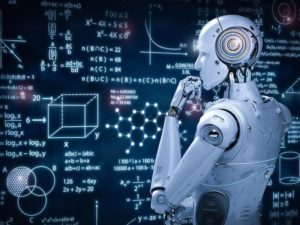 Throughout history, imagination, if not chance, has been the determining factor in advancing science. Science fiction has set the tone for many scientists, and futuristic theorists are now pointing the way to research. The differences between biologists and postbiologists divide the advance of science into two directions, although both converge on certain interests.
Throughout history, imagination, if not chance, has been the determining factor in advancing science. Science fiction has set the tone for many scientists, and futuristic theorists are now pointing the way to research. The differences between biologists and postbiologists divide the advance of science into two directions, although both converge on certain interests.
NASA has seen how space exploration can be done either through AI capable of abstract and conceptual thinking, or through a post-biological transhumanism that is useful for colonizing other planets. This means that digitized minds or AI machines can be sent into space while using cyborgs for planetary colonization.
So great is the faith that some people have that in the future they will be able to save their mind on a pendrive, upload it to a digital medium and travel the cosmos, that they would be willing to experiment with methods that would endanger their biological life, even if they were not sure of doing so. This faith can be seen even in the business world. Companies focused on cosmic tourism hope to sell space tours to the first transhumans with the capacity to survive in space [4] .
There's still a lot of digging to be done
While there have always been technological inventions or scientific discoveries that have advanced humanity, never has such a radical change been proposed that would mean leaving behind the concept of life as we know it. The least optimistic estimates establish the end of the 21st century as the date for knowing the slightest secrets of the brain and its relationship with thought, but, whenever that is the case, there is no doubt that the day a thought or memory is isolated will be the day when a synthetic copy is created.
Certainly, at present we still do not know what is or how thought or memory are generated, which are true mysteries of science, even though we know how to inoculate, manipulate and erase them. Only the fact of finding in the brain the matter of thought would give an answer to the eternal question about the relationship between body and mind. Thus, the way in which thoughts are generated and their way of transmission would be revealed. It would be known why each brain generates different thoughts, and why some ideas are accepted even if they are totally irrational. Not even neuroscience can explain today how neurons process, form, store, dynamize and remember information.
To be able to give an answer to this enigma is of vital importance for the future development of the human being, since to demonstrate that mind and thought are a unique entity, with the electrochemistry of the brain producing particles of thought, would make biotechnology a transhumanist option.

If, on the other hand, the mind is found to be a distinct entity from the brain, any post-biological option would be appropriate for improving capabilities and increasing longevity. The idea of a universe explored by post-biological minds not dependent on nutrients and chemical synapses would mean a Copernican turn in the relationship with the universe. At the moment, the only thing that is certain is the relationship of the brain's biochemistry with emotions, sensations and feelings.
To remove the mind from a body is something that can be proposed, hardly theorized and chimerically realized. But, as fanciful as it may seem, the project is already underway.
In human imperfection lies beauty
The theory of the "uploaded" mind does not explain how such an operation is performed, nor how the mind has different moods, nor how it reacts emotionally to different stimuli.
The truth is that there has been no great progress in recent decades in this regard. There is still no consensus on a definition of mind and it is not known how knowledge is stored in the brain. On the other hand, a dualistic theory that held that mind is not composed of matter, that it is timeless and that it is an indivisible whole, would give rise to investigating its nature outside the physical world, opening very diverse fronts within metaphysics.
At the moment, it is known that states of consciousness are related to electrochemical activities of the brain, what chemical changes occur with different feelings and which brain waves prevail according to the states of consciousness. These correlations or dependencies lead to the assumption that consciousness emerges from a biological substrate, although the final fruit may not be bilogical, as has been known until now.
Consciousness is a hitherto unknown element, but, paradoxically, it is what has allowed us to discover the remaining range of elements available to us on Earth. This is what the emerging theory of mind tries to explain to us: that the mind is a product of natural biology but that the end result is unknown. Both this theory and the unitary one reject the idea of a possible mental transcendence, and link the existence of mind to that of a biological support. On the other hand, the dual theory holds that the mind can exist beyond the body. Cyberpunk futurism adopts this thesis, but does not want to leave its continuity in the hands of a demiurge or fate, and fights to achieve transcendence by artificial methods.

The brain, its activity, nutrients, chemicals and waves have been studied from innumerable scientific perspectives, but the day has not come when there is a solid doctrinal body, universally accepted, explaining the nature and characteristics of the mind. The detailed knowledge of mind is key to many scientific disciplines, since its lack complicates the definition of the reality we experience, or existence itself. The mind, consciousness, is the unknown element that differentiates a simple organic (or inorganic) system from a human being, or from a conscious animal.
We could say that reality is a stratified construction of elements that arise in the physical realm, reach biology and end up in the mind. In other words, reality would form a chain of elements that, emerging from the attributes of physics, would pass through biology to end up being perceived by the mind, like the pain produced by a blow or the taste of a fruit[5] . Following this logic, the fracture of a link, like a disease of the biological part, alters the mind's perception of the outside world. Thus, a person with neurodegenerative problems would not perceive the physical world in an objective way.
Neurosciences have amply demonstrated the intimate relationship between human biology and its mental product. But neuroscience remains stagnant in electrochemical relations, because, although it is possible to monitor neuronal activity instantly, it has not yet been possible to clarify what consciousness is; however, it is this discipline that must establish the point of union between neurons and consciousness, even if later it passes the baton to other disciplines.
But before this relay takes place, it is necessary to know the totality of the elements that are activated to create consciousness, thought; the biological link must be well defined and explained. Consciousness is the apex of biology, the element that allows it to interact with the environment, to process the information collected by the organs of the body and the nervous system; it is the command center of all the biological machinery. The mind is born and evolves with the body, but does not have to limit or subjugate itself to it.
Philosophers of the mind are explorers who enter virgin territories where they encounter new forms of knowledge that they try to relate to scientific knowledge, opening new paths for science to enter.
When it was thought that metaphysics had been surpassed by the scientific method, we came across it again to find formulas of understanding between the physics of neurons and the abstract concept of mind. What if the mind was a divisible unit of biology, but depended on it? What is the relationship of dependence of the mind with the brain?
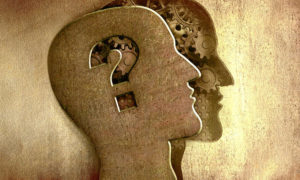 At the moment there is no evidence that the mind is a biological element, and its existence in the physical world has not even been proven, as it has not been possible to isolate and analyze it. In what part of the brain do we look for and reproduce the face of a loved one? Where do I find the good moments of the past? These are unanswered questions, because, despite knowing the areas of the brain where neurons are activated, and the chemical synapses that arise when remembering, the memory is if not tangible.
At the moment there is no evidence that the mind is a biological element, and its existence in the physical world has not even been proven, as it has not been possible to isolate and analyze it. In what part of the brain do we look for and reproduce the face of a loved one? Where do I find the good moments of the past? These are unanswered questions, because, despite knowing the areas of the brain where neurons are activated, and the chemical synapses that arise when remembering, the memory is if not tangible.
This is the main reason why natural sciences have rejected the study of the mind, being relegated to philosophical speculations.
The nature of mind may have a relationship with the physical biological part, but it is mind that gives orders to the body; any practice learned is executed from our mind outward, using the body as the acting element. Mind acts on the brain, and the brain acts on the body.
This implies that the mind, in its freedom of action, affects biological matter, a force that cannot be explained by the known physical laws.
For several decades, an attempt has been made to explain the mind-body relationship by means of quantum mechanics, an approach that questions all previous beliefs, such as the Pythagorean one, that reality can be explained in abstract mathematical terms or that all physical facts have an explanation in mechanical causality, thus proposing a different relationship between mind and matter[6] . Once in the quantum world, reality is no longer a linear concept, and many probabilistic interpretations open up as to what interaction implies.
In any case, the inability of human beings to explain the most characteristic aspect of their existence, consciousness, does not prevent them from manipulating the elements of the equation, from psychology to chemistry. After all, using machinery that we do not understand is something that most of us do every day: we drive a car, but without knowing how it works; or we use the software of a computer without understanding the structure of the hardware.
In the field of politics, the concept of mentality and its links with cultural and biological factors have been widely studied. Each study has given rise to a pattern of behavior that has made it possible to determine patterns of conduct in different social sectors. Since ancient times, techniques of deception, psychological tricks that would lead the population down the desired path, have been applied. In recent years, these tricks have been modernized with the application of neuroscientific knowledge to the political mind.
Pedro Baños. Author of "El Dominio Mental".
[1] Lorrimar (2019)
[2] Broderick (2014)
[3] Koene (2014)
[4] Cohen and Spector (2019)
[5] Clayton (2004)
[6] Barros and Montemayor (2019)
Bibliography
Barros, José Acacio de, and Montemayor, Carlos. "Where Does Quanta Meet Mind?" Quanta and Mind. Springer:55-66. 2019.
Broderick, Damien. "Introduction I: Machines of Loving Grace (Let's Hope)." Intelligence Unbound: Future of Uploaded and Machine Minds:1-10. 2014.
Clayton, Philip. Mind and Emergence: From Quantum to Consciousness .Oxford University Press. 2006.
Cohen, Erik, y Spector, Samuel. "Transhumanism and cosmic travel." Tourism Recreation Research:1-9. 2019.
Koene, Randal A. "Feasible mind uploading." Intelligence Unbound: The Future of Uploaded and Machine Minds:90-101. 2014.
Lorrimar, Victoria, "Mind Uploading and Embodied Cognition: A Theological Response"; Zygon 54.1:191-206. 2019
 Copyright secured by Digiprove © 2020 Quixote Globe
Copyright secured by Digiprove © 2020 Quixote Globe